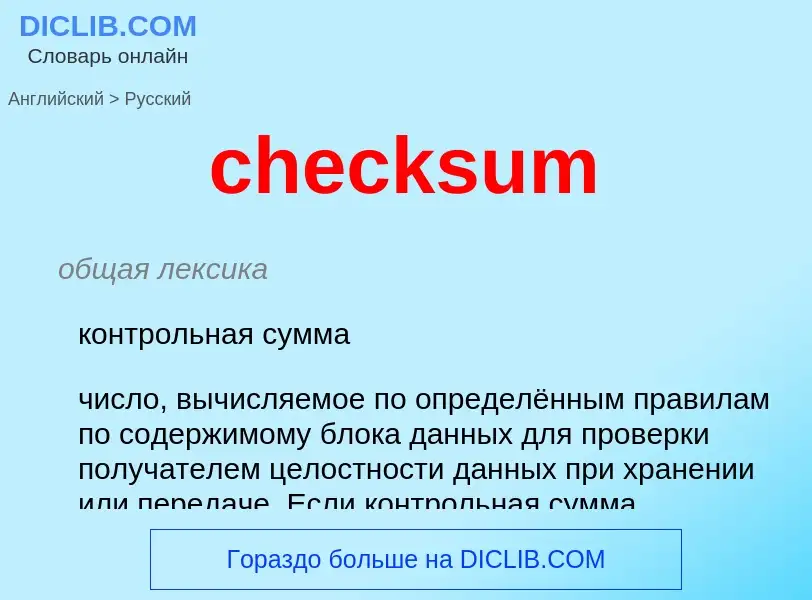Vertaling en analyse van woorden door kunstmatige intelligentie ChatGPT
Op deze pagina kunt u een gedetailleerde analyse krijgen van een woord of zin, geproduceerd met behulp van de beste kunstmatige intelligentietechnologie tot nu toe:
- hoe het woord wordt gebruikt
- gebruiksfrequentie
- het wordt vaker gebruikt in mondelinge of schriftelijke toespraken
- opties voor woordvertaling
- Gebruiksvoorbeelden (meerdere zinnen met vertaling)
- etymologie
checksum - vertaling naar russisch
общая лексика
контрольная сумма
число, вычисляемое по определённым правилам по содержимому блока данных для проверки получателем целостности данных при хранении или передаче. Если контрольная сумма, вычисленная получающим устройством, не совпадает с принятой контрольной суммой, то целостность данных нарушена. Простейший способ получения контрольной суммы - сложением содержимого всех байтов блока данных по модулю 256
Смотрите также
- authentication checksum
- bad checksum
- cryptographic checksum
- data checksum
- key checksum
- message checksum
- message integrity checksum
- tamper-proof checksum
Definitie
Wikipedia
A checksum is a small-sized block of data derived from another block of digital data for the purpose of detecting errors that may have been introduced during its transmission or storage. By themselves, checksums are often used to verify data integrity but are not relied upon to verify data authenticity.
The procedure which generates this checksum is called a checksum function or checksum algorithm. Depending on its design goals, a good checksum algorithm usually outputs a significantly different value, even for small changes made to the input. This is especially true of cryptographic hash functions, which may be used to detect many data corruption errors and verify overall data integrity; if the computed checksum for the current data input matches the stored value of a previously computed checksum, there is a very high probability the data has not been accidentally altered or corrupted.
Checksum functions are related to hash functions, fingerprints, randomization functions, and cryptographic hash functions. However, each of those concepts has different applications and therefore different design goals. For instance, a function returning the start of a string can provide a hash appropriate for some applications but will never be a suitable checksum. Checksums are used as cryptographic primitives in larger authentication algorithms. For cryptographic systems with these two specific design goals, see HMAC.
Check digits and parity bits are special cases of checksums, appropriate for small blocks of data (such as Social Security numbers, bank account numbers, computer words, single bytes, etc.). Some error-correcting codes are based on special checksums which not only detect common errors but also allow the original data to be recovered in certain cases.

